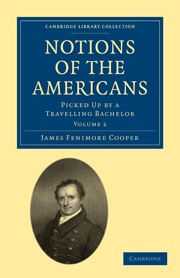Book contents
- Frontmatter
- Contents
- Lately Published
- LETTER I To the Count Jules de Béthizy
- LETTER II To the Abbate Giromachi
- LETTER III To the Same
- LETTER IV To the Count Jules de Béthizy
- LETTER V To the Baron Von Kemperfelt
- LETTER VI To the Abbate Giromachi
- LETTER VII To the Same
- LETTER VIII To the Count Jules de Béthizy
- LETTER IX To the Professor Christian Jansen
- LETTER X To Sir Edward Waller, Bart
- LETTER XI To the Same
- LETTER XII To the Professor Jansen
- LETTER XIII To the Count Jules de Béthizy
- LETTER XIV To the Abbate Giromachi
- LETTER XV To the Professor Christian Jansen
- LETTER XVI To Sir Edward Waller, Bart
- LETTER XVII To the Same
- LETTER XVIII To the Same
- LETTER XIX To the Count Jules de Béthizy
- LETTER XX To the Same
- LETTER XXI To Sir Edward Waller, Bart
- NOTES
LETTER XVII - To the Same
Published online by Cambridge University Press: 29 August 2010
- Frontmatter
- Contents
- Lately Published
- LETTER I To the Count Jules de Béthizy
- LETTER II To the Abbate Giromachi
- LETTER III To the Same
- LETTER IV To the Count Jules de Béthizy
- LETTER V To the Baron Von Kemperfelt
- LETTER VI To the Abbate Giromachi
- LETTER VII To the Same
- LETTER VIII To the Count Jules de Béthizy
- LETTER IX To the Professor Christian Jansen
- LETTER X To Sir Edward Waller, Bart
- LETTER XI To the Same
- LETTER XII To the Professor Jansen
- LETTER XIII To the Count Jules de Béthizy
- LETTER XIV To the Abbate Giromachi
- LETTER XV To the Professor Christian Jansen
- LETTER XVI To Sir Edward Waller, Bart
- LETTER XVII To the Same
- LETTER XVIII To the Same
- LETTER XIX To the Count Jules de Béthizy
- LETTER XX To the Same
- LETTER XXI To Sir Edward Waller, Bart
- NOTES
Summary
The next subject of interest, after the unfortunate descendants of the Africans, that has been brought into my notice by this southern tour, is the remnant of the original possessors of these regions. By far the most numerous, and the most important of the native tribes, which still continue in the immediate vicinity of the whites, are those which occupy reservations in Georgia, the Floridas, Alabama, Mississippi, and Tenessee. The lingering fragments of a hundred tribes are certainly seen scattered over the immense surface of this country, living on greater or less tracts that had been secured to them, or dwelling by sufferance in the woods; but the only people now residing east of the Mississippi who can aspire to the names of nations, are the Creeks, the Choctaws, the Chickasaws, the Cherokees, and the Seminoles, all of whom dwell in the portion of country I have named.
As a rule, the red man disappears before the superior moral and physical influence of the white, just as I believe the black man will eventually do the same thing, unless he shall seek shelter in some other region. In nine cases in ten, the tribes have gradually removed west; and there is now a confused assemblage of nations and languages collected on the immense hunting grounds of the Prairies.
It is impossible to say any thing of the numbers of the Indians, except by conjecture, since they are not considered as coming properly within the computations of the census.
- Type
- Chapter
- Information
- Notions of the AmericansPicked Up by a Travelling Bachelor, pp. 367 - 383Publisher: Cambridge University PressPrint publication year: 2009First published in: 1828



